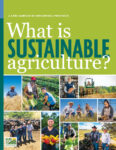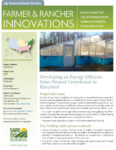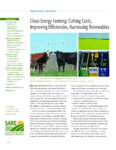The educational materials listed on this page are about Energy Conservation/Efficiency.
The conservation of farm energy is important to both its environmental and economic sustainability. For example, efficiency on the farm is particularly important during colder months in order to reduce greenhouse energy use for vegetable farmers. Likewise, farmers growing row crops may find that fuels used to run equipment cut into the cost of production. Agricultural efficiency can be achieved by conducting a farm energy audit to determine the best ways to cut down on energy use. SARE’s resources can help you determine the best ways to increase efficiency on your farm. Key practices include byproduct utilization, bioenergy and biofuels, biodiesel, biofuel feedstocks, energy use and consumption, energy conservation/efficiency, renewable energy, solar energy, wind power, geothermal.
SARE’s book Building a Sustainable Business helps farmers build both a sustainable and profitable business plan that includes renewable energy and biofuel. The SARE bulletin Clean Energy Farming: Cutting Costs, Improving Efficiencies, Harnessing Renewables helps farmers utilize clean energy practices on their operations, which may include utilizing byproducts for biodiesel production and other renewable fuels. The Farm Energy Audits section of the E3A: Energy Education for Producers curriculum includes information on many operational areas that can see improved agricultural efficiency through the use of a farm energy audit, including equipment, grain drying, irrigation and livestock watering systems, the farm shop, livestock buildings and more. The Farm Energy Topic Room provides a wealth of information on clean energy topics, including biodiesel, farm energy audits, solar and wind energy, and more.
Showing 1-10 of 11 results

What is Sustainable Agriculture?
This award-winning report provides a sampler of best practices in sustainable agriculture—from marketing and community vitality to cover crops and grazing—as well as eight profiles of producers, educators and researchers who have successfully implemented them.
Northeast Farm Energy IQ
Farm Energy IQ offers free information to help farmers enhance operational sustainability in the context of the farm economy and ecosystem.

The Sustainability of Biofuel Fact Sheet Series
This 18-part series addresses topics related to the sustainability of biofuel production, including biodiversity, greenhouse gas reductions, life cycle analysis and more.

Developing an Energy Efficient, Solar-Heated Greenhouse in Maryland
This project investigated the effectiveness of energy-efficient greenhouse design and the ability of water-heating solar panels to heat a greenhouse as a propane alternative.

Cover Crops and No-Till Management for Organic Systems
This Rodale Institute fact sheet reviews the use of cover crops and no-till in organic systems, including selection, establishment and mechanical termination of cover crops; crop rotations; and energy and production budgets.

Thermal Banking for Cold Storage
Steven Schwen's innovative energy conservation strategy uses thermal banking technology to conserve heat in his greenhouse and for cold storage.

Thermal Banking Greenhouses
Steven Schwen uses thermal banking to significantly reduce the energy costs of running a greenhouse for cold-season production.
Greenhouse Energy Conservation Strategies and Alternative Fuels
Includes curriculum materials, extension bulletins, resource lists, and a greenhouse energy model that were developed with the intention that educators can use the materials in full or part to deliver programming on energy management and conservation for greenhouse production.

Small-Scale Biogas Technology
This website has information on technology for turning organic waste into biogas for small-scale, on-farm energy applications.

Clean Energy Farming
Clean Energy Farming: Cutting Costs, Improving Efficiencies, Harnessing Renewables features innovative SARE-funded research and examples of farmers who are improving energy efficiency while saving money, implementing farming practices that both save energy and protect natural resources, and producing and using renewable fuels.